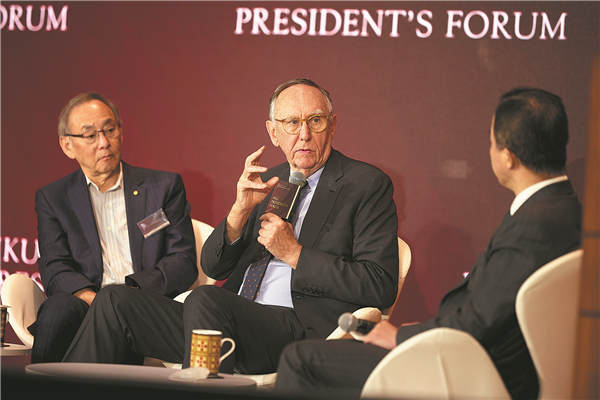Forum calls for open, accessible collaboration


The inaugural HKU President's Forum was successfully held on April 3 at the University of Hong Kong's Loke Yew Hall. Four pioneering scientists and Professor Zhang Xiang, the president and vice-chancellor of HKU, and convener of the Forum, exchanged in-depth views on the important role of science in securing the future of humanity, and in addressing global issues, such as climate change, achieving sustainable growth and development, and mitigating aging.
The four academics, who participated in the forum, were Dame Carol Black, an accomplished clinician and UK government adviser; Steven Chu, Nobel laureate in physics and former US Secretary of Energy; Jack Dangermond, founder of the Environmental Systems Research Institute, who also led the development of geographic information systems; and John Hennessy, the former president of Stanford University who won the Turing Award in 2017.
Chu, a passionate advocate of clean energy, spoke eloquently about the progress his lab and other US companies have made in reducing carbon emissions and enhancing the use and storage of renewable energy to meet the global goal of achieving carbon neutrality by 2060.
He said he believes that universities play an important role in working with the government and developing the most effective policies.
Chu argued that poor countries should be helped to access the science and technology that can contribute to their economic growth, noting that "rich countries should, and must, help the poorer countries in responding to their changing climates. They do have an obligation".
Black has been committed to using her knowledge and research to help the government develop policies that benefit society.
She has advised the UK government on a range of issues, including mental health, drug use, the workforce, young people and inadequate aftercare services.
Black has spent years researching and revealing the causes and treatments of scleroderma, a potentially fatal disease, and noted that her three decades of work have proved "how basic science, technology, healthcare infrastructure and effective collective effort can transform the most lethal complication of the most lethal rheumatic disease".
Dangermond said he admires the transformation that innovative technological advances have brought to the world.
He claimed that, with the development of the internet and other aspects of the digital age, the world today is increasingly complex and interconnected, resembling a giant ecosystem; yet the threats of overpopulation, climate change and fragile ecosystems remain a huge challenge to sustainable development.
He emphasized the importance of cross-discipline and cross-sectoral collaboration in building a sustainable future. "The rapidly emerging global geospatial infrastructure will profoundly transform how we manage our world," he said.




































